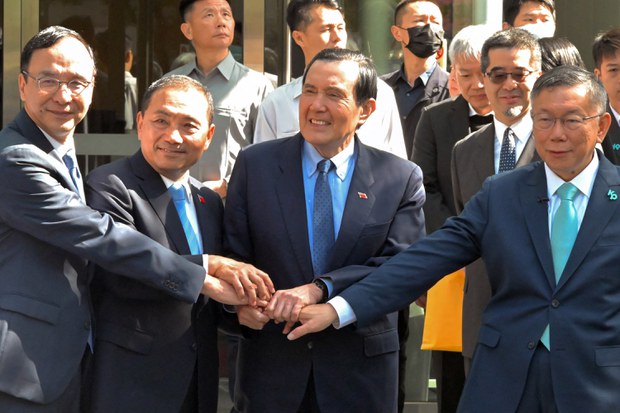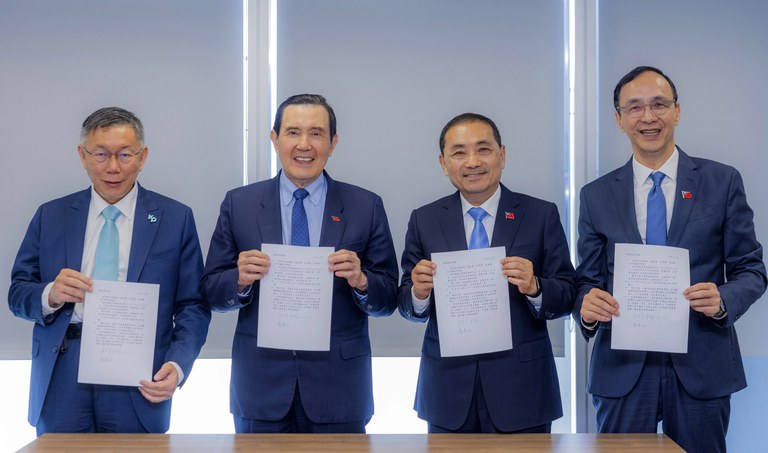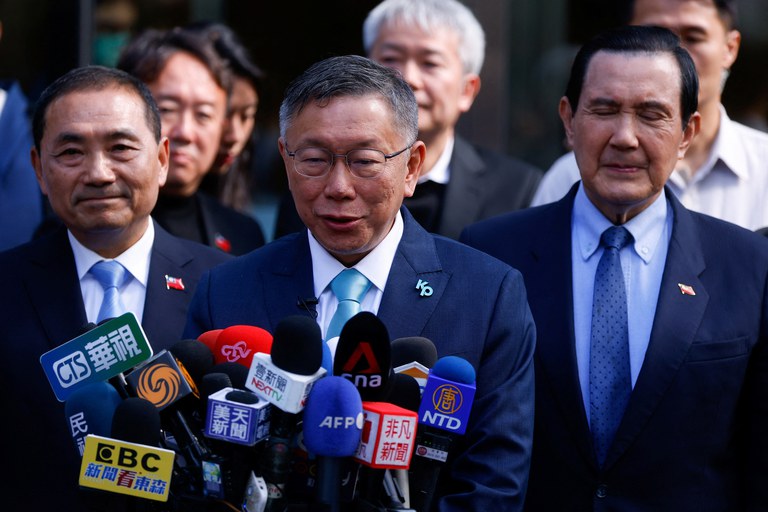Taiwan’s opposition parties join forces in presidential race
Share

From left: Eric Chu, Taiwan’s main opposition Kuomintang (KMT) chairman, Hou Yu-ih, KMT presidential candidate, Ma Ying-jeou, former Taiwan president and Ko Wen-je, presidential candidate from the Taiwan People’s Party (TPP) pose following a meeting in Taipei on Wednesday, Nov. 15, 2023.
Two key opposition parties in democratic Taiwan have joined forces to fight forthcoming presidential elections, in a late bid to deliver candidates who will likely focus on the island’s future amid growing military incursions from Beijing.
The main opposition Kuomintang, which lost the presidency to the ruling Democratic Progressive Party’s Tsai Ing-wen for two successive terms amid ongoing fears of Chinese Communist Party infiltration, and the Taiwan People’s Party agreed to run a joint campaign in a political breakthrough on Wednesday that has ended months of deadlock over an opposition platform that will likely promise better relations with Beijing amid ongoing military tensions.
The deal came after a two-hour meeting between Kuomintang presidential nominee Hou Yu-ih, Taiwan People’s Party chairman and presidential nominee Ko Wen-je, Kuomintang Chairman Eric Chu and former Kuomintang President Ma Ying-jeou.
A recent opinion poll put incumbent vice president Lai Ching-te at about 29.7%, followed by Ko Wen-je at 25.6% and Hou Yu-ih at 21.1%, ahead of the Jan. 13, 2024 poll.


In a joint statement, the parties said they would decide jointly on which candidates to field for president and vice president after running a nationwide opinion poll.
“Polling statistics experts will review and evaluate the poll results … from Nov. 7-17, and the Kuomintang and the People’s Party will each provide the results of the internal reference poll,” the statement said, adding that three polling experts would be recommended, one each by Ma, the KMT and the People’s Party.
“Witnessed by former President Ma, the Kuomintang and the People’s Party hereby promise to establish a model for Taiwan’s third wave of democratic reforms, and must form a coalition government,” it said, adding that defense matters, foreign relations and the cross-strait relationship with Beijing would be the preserve of the president, should they win the January 2024 election.
Other ministerial posts would be distributed among the two parties according to the number of seats their candidates hold in the legislature, it said.
The poll results will be formally announced on Nov. 18.
“No matter the outcome … [we] will work together to make the land and people of the Republic of China safe,” Hou told journalists on Wednesday, using the formal name of the Taiwanese government that dates back to the 1911 republic founded by Sun Yat-sen after the fall of the Qing dynasty (1644-1911).
Hou later commented that he hopes the two parties can work together to “unite Taiwan.”
“We should follow public opinion … remove the corrupt and incompetent Democratic Progressive Party and ensure peace and stability in the Taiwan Strait, and peace of mind for our people,” he said.
A sense or urgency
Yet Ko and the Kuomintang appear to make uneasy bedfellows.
Ko, who has previously quipped that the things he hates most are “mosquitoes, cockroaches and the Kuomintang,” was asked at a youth forum why he has now chosen to work with the party.
“I have an answer to this,” Ko told the students who challenged him on the move. “I hate the Democratic Progressive Party even more.”
He said there is now a sense of urgency around peace and stability in the Taiwan Strait, citing the topic as a key item on the agenda when Chinese leader Xi Jinping meets with U.S. President Joe Biden in the United States.
“Taiwan is the place where war is most likely to happen,” Ko said.
“War in Taiwan isn’t an impossibility,” he warned, adding: “The risk is there.”


Ma, who facilitated the negotiations, told the media that the agreement had made political history.
“I believe this is a very memorable day for Taiwan and for our two parties, and we will go all out, in accordance with the cooperation agreement,” he told reporters.
The agreement comes amid growing concerns over the Kuomintang’s appetite for ever-closer ties with Beijing, as a local media outlet reported that Ma Ying-jeou Foundation director Hsiao Hsu-tsen attended the Beijing Forum hosted by Peking University at the Diaoyutai Hotel, during which time he met with senior officials of the State Council’s Taiwan Affairs Office.
Hsiao later denied meeting with Taiwan Affairs Office director Song Tao, or attending any activities organized by his staff.
Tung Li-wen, an advisory committee member of a Taiwanese think tank, said he doesn’t believe Ma was motivated by unity in brokering the deal.
“It seems that Ma Ying-jeou’s most important consideration is the relationship with Beijing, which also involves his positioning in cross-strait relations after the election,” Tung told Radio Free Asia. “It is not about his positioning within the Kuomintang.”
Translated by Luisetta Mudie.







